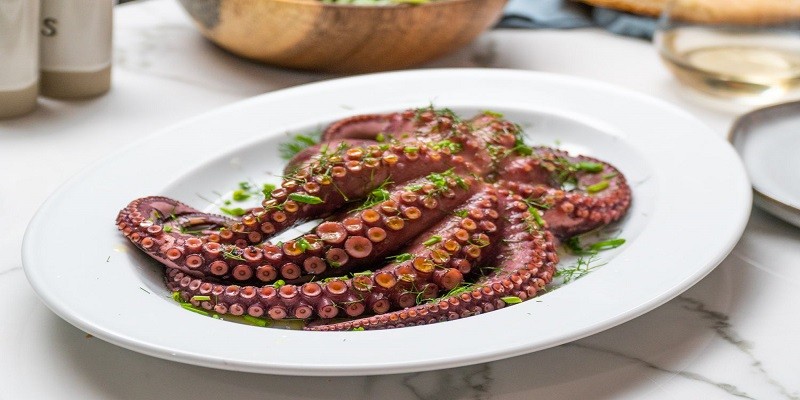Last Updated on May 23, 2024
Yes, pregnant women can eat octopus, but it must be fully cooked. Consuming raw or undercooked octopus can pose risks due to potential bacteria and parasites. Additionally, it is important to consume octopus in moderation due to its mercury content, which is generally low to moderate.
Octopus is a popular seafood delicacy enjoyed in various cuisines around the world. For pregnant women, maintaining a balanced and nutritious diet is crucial for the health of both the mother and the developing baby. While seafood is a great source of essential nutrients, it also comes with certain risks, particularly concerning mercury levels and foodborne illnesses. This article explores whether pregnant women can safely include octopus in their diet and provides guidelines for its consumption.
What is Octopus?
Octopus is a type of mollusk belonging to the cephalopod family, which also includes squid and cuttlefish. Known for its eight arms lined with suction cups, octopus is a versatile ingredient in many culinary traditions. It is often classified as shellfish, despite lacking a traditional shell. Octopus can be prepared in various ways, including grilling, boiling, and baking, and is prized for its tender texture and mild flavor when cooked properly.
Nutritional Value of Octopus
| Nutritional Value | Details |
|---|---|
| Calories | 139 kcal per 3 ounces (85g) |
| Protein | 25.4g per 3 ounces (85g) |
| Fat | 1.8g per 3 ounces (85g) |
| Carbohydrates | 3.7g per 3 ounces (85g) |
| Vitamin B12 | 1,275% of the Daily Value (DV) per 3 ounces (85g) |
| Selenium | 139% of the DV per 3 ounces (85g) |
| Iron | 45% of the DV per 3 ounces (85g) |
| Copper | 70% of the DV per 3 ounces (85g) |
| Omega-3 Fatty Acids | High content, beneficial for heart health |
Risks of Eating Octopus During Pregnancy
| Risks | Details |
|---|---|
| Mercury Levels | Octopus contains low to moderate levels of mercury, which can be harmful in large quantities. |
| Foodborne Illness | Consuming raw or undercooked octopus can lead to infections from bacteria, viruses, and parasites. |
| Allergies | Octopus is a type of shellfish, and those with shellfish allergies should avoid it. |
| High Sodium | Some preparations of octopus can be high in sodium, which should be monitored during pregnancy. |
Safe Ways to Eat Octopus During Pregnancy
To safely enjoy octopus during pregnancy, it is essential to ensure it is fully cooked. Cooking methods such as grilling, boiling, and baking are recommended as they effectively kill harmful bacteria and parasites. Pregnant women should avoid raw preparations like sashimi, carpaccio, and marinated octopus. Additionally, it is advisable to consume octopus in moderation, limiting intake to one or two servings per week to minimize mercury exposure.
Alternatives to Octopus During Pregnancy
| Alternatives | Precautions |
|---|---|
| Shrimp | Ensure it is fully cooked to avoid foodborne illnesses. |
| Salmon | Opt for wild-caught varieties and cook thoroughly. |
| Cod | Low in mercury, but should be cooked properly. |
| Squid (Calamari) | Safe when fully cooked; avoid raw preparations. |
| Canned Tuna | Choose light tuna and limit intake to avoid mercury. |
Experts Tips
- Moderation is Key: Limit octopus consumption to one or two servings per week to minimize mercury exposure.
- Proper Cooking: Ensure octopus is cooked to an internal temperature of at least 145°F to kill harmful bacteria.
- Consult Your Doctor: Always check with your healthcare provider before adding new foods to your pregnancy diet.
FAQs
Is it safe to eat octopus during pregnancy?
Yes, it is safe to eat octopus during pregnancy as long as it is fully cooked and consumed in moderation to avoid mercury exposure.
What are the benefits of eating octopus during pregnancy?
Octopus is rich in protein, omega-3 fatty acids, and essential vitamins and minerals like iron and vitamin B12, which are beneficial for both mother and baby.
Can I eat octopus sashimi while pregnant?
No, raw octopus sashimi should be avoided during pregnancy due to the risk of foodborne illnesses from bacteria and parasites.
How much octopus can I eat while pregnant?
It is recommended to limit octopus consumption to one or two servings per week to minimize mercury exposure.
What are the signs of an allergic reaction to octopus?
Symptoms of an allergic reaction to octopus can include hives, swelling, difficulty breathing, and gastrointestinal distress. Seek medical attention if you experience any of these symptoms.
Conclusion
Pregnant women can safely enjoy octopus as part of their diet, provided it is fully cooked and consumed in moderation. Octopus offers numerous nutritional benefits, including high levels of protein, omega-3 fatty acids, and essential vitamins and minerals. However, it is crucial to avoid raw or undercooked octopus to prevent foodborne illnesses and to monitor mercury intake. Always consult with a healthcare provider before making any significant changes to your diet during pregnancy.

